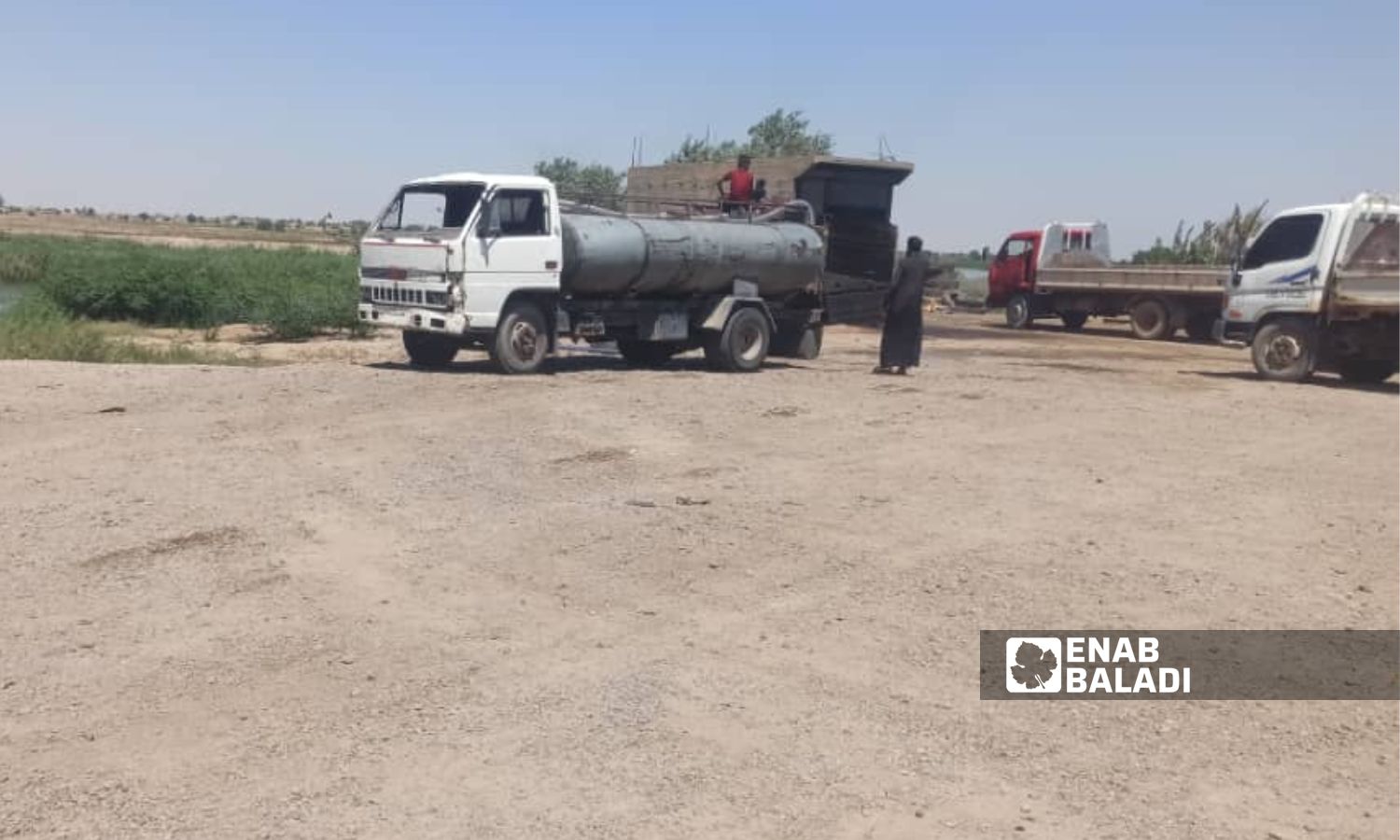



Deir Ezzor – Obadah al-Sheikh
Residents of the town of al-Shannan in the eastern countryside of Deir Ezzor, where the Autonomous Administration of North and East Syria (AANES) controls, suffer from the lack of drinking water, forcing them to dig artesian wells to secure water and reduce costs resulting from the high prices of water tankers.
Despite the availability of a water station that was reactivated two years ago, the project was not completed by the Autonomous Administration’s services committee nor by international and local organizations operating in the area, causing the station to stop working just months after it was launched.
More than 13,000 people live in the town, suffering from a shortage of drinking water in the town located on the eastern bank of the Euphrates River.
Residents of the town, who spoke to Enab Baladi, suffer from the high prices of water tanks and the scarcity of tankers. Customers have to wait for more than a full day to buy the amount of water they need.
Saddam al-Ali, a resident of the town, told Enab Baladi that the al-Shannan water station was built two years ago, along with a water reservoir (drinking water tank), and those in charge of the project extended pipelines from the water station to the town’s water outlet (the tower) responsible for distributing drinking water to the town’s neighborhoods.
The same pipeline was operational before 2010 and provided water to a significant part of the town’s houses. However, it stopped working since then, causing a water crisis in the town.
In the current July, al-Ali buys water tankers at the price of 40,000 Syrian pounds for every ten barrels and needs to wait a day or two sometimes to get his requirements of water, which is often unusable due to lack of filtration and disinfection. This forces residents to buy filtered water at the price of 20,000 pounds per barrel, enough for a few days.
The dollar equals approximately 15,000 Syrian pounds in the region that primarily uses the pound for daily transactions.
For his part, Khaled al-Khalif, a livestock keeper in the same town, said that the suffering is not limited to providing water for his family but also works hard to secure water for three cows and 30 sheep he raises.
The livestock raised by al-Khalif needs three or four barrels of water daily, and he cannot ignore their feeding needs, according to al-Khalif, who takes livestock raising as his profession and source of livelihood.
A nurse at the al-Shahil Specialist Hospital in eastern Deir Ezzor, who preferred not to reveal his name as he is not authorized to speak to the media, told Enab Baladi that more than 25 cholera cases were admitted to the hospital in the past months due to water contamination.
He added that other cases were treated in private hospitals and some at local pharmacies frequented by many residents seeking treatment.
According to the nurse, hospitals in the area have dealt with many cases of allergies among children due to water contamination, although there is no accurate statistic due to the lack of a specialized department in Deir Ezzor.
Amid rising water prices via tankers and the absence of any looming solutions, some residents have resorted to digging wells in their homes. Munir al-Abd, a resident of al-Shannan, told Enab Baladi that he dug a well inside his house despite the high cost. He added that he resorted to manual digging to avoid the costs of specialized well-drilling machinery.
Al-Abd added that water emerges from a depth ranging between eight to ten meters and is brackish (not suitable for drinking), but it is suitable for watering crops and some household uses.
He pointed out that the cost of digging a well could reach 7.5 million pounds (500 dollars), including other necessities to extract water such as pipes and electrical cables.
The Syrian Democratic Forces (SDF), the military umbrella of the Autonomous Administration, had converted part of the water stations in the eastern Deir Ezzor countryside under its control into military points following the end of its confrontations with Arab tribes in early September 2023.
if you think the article contain wrong information or you have additional details Send Correction